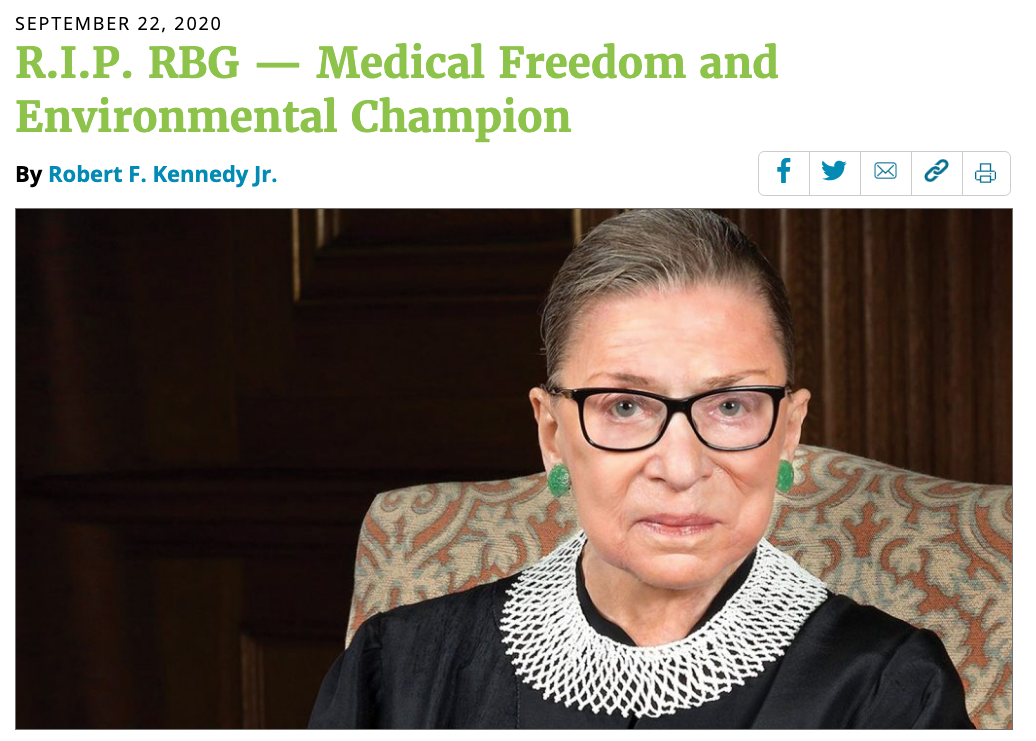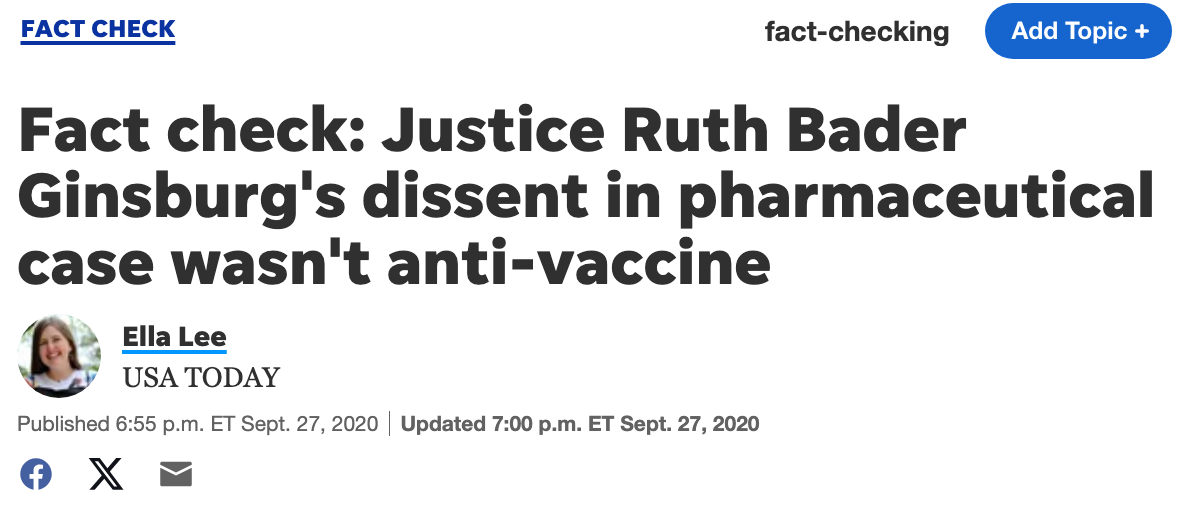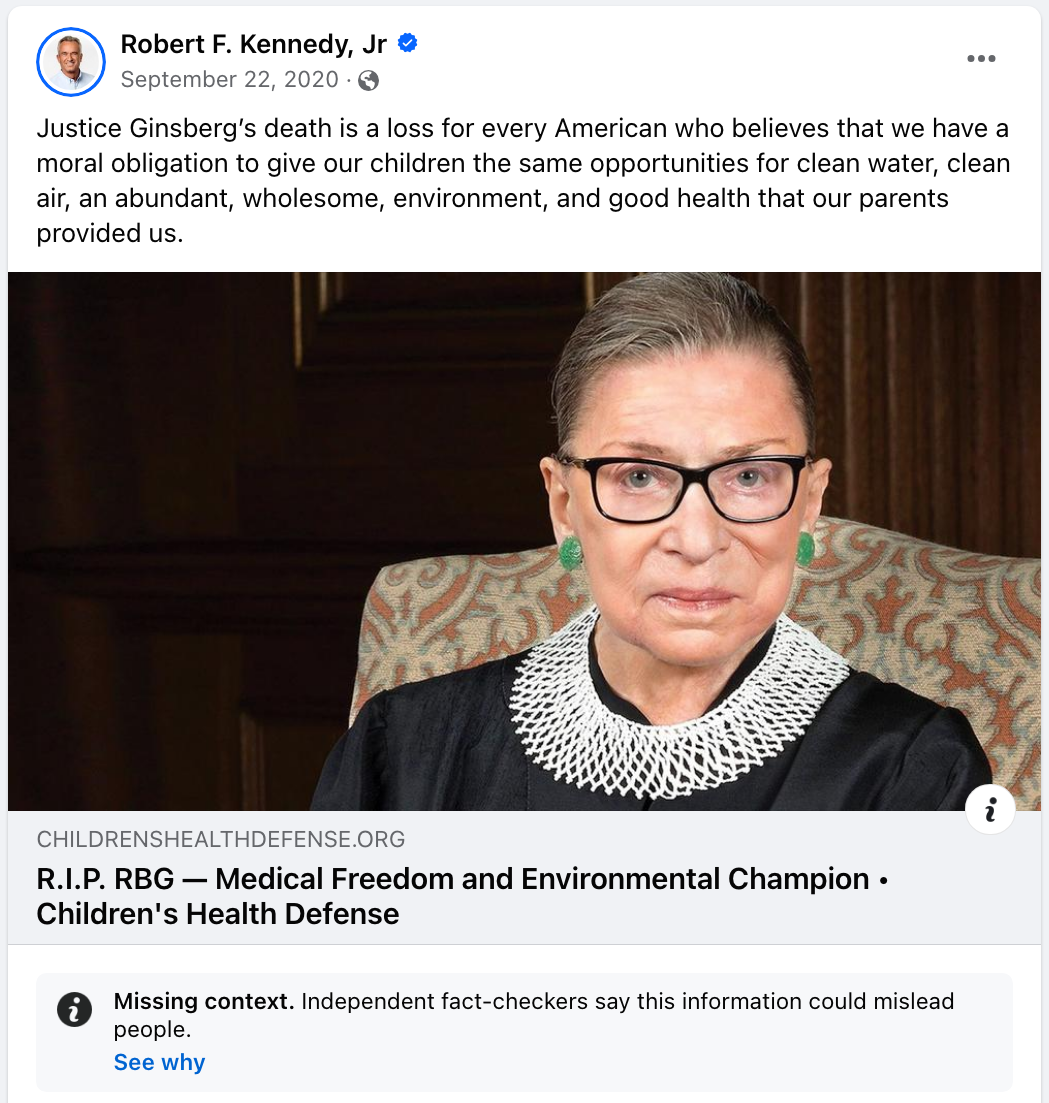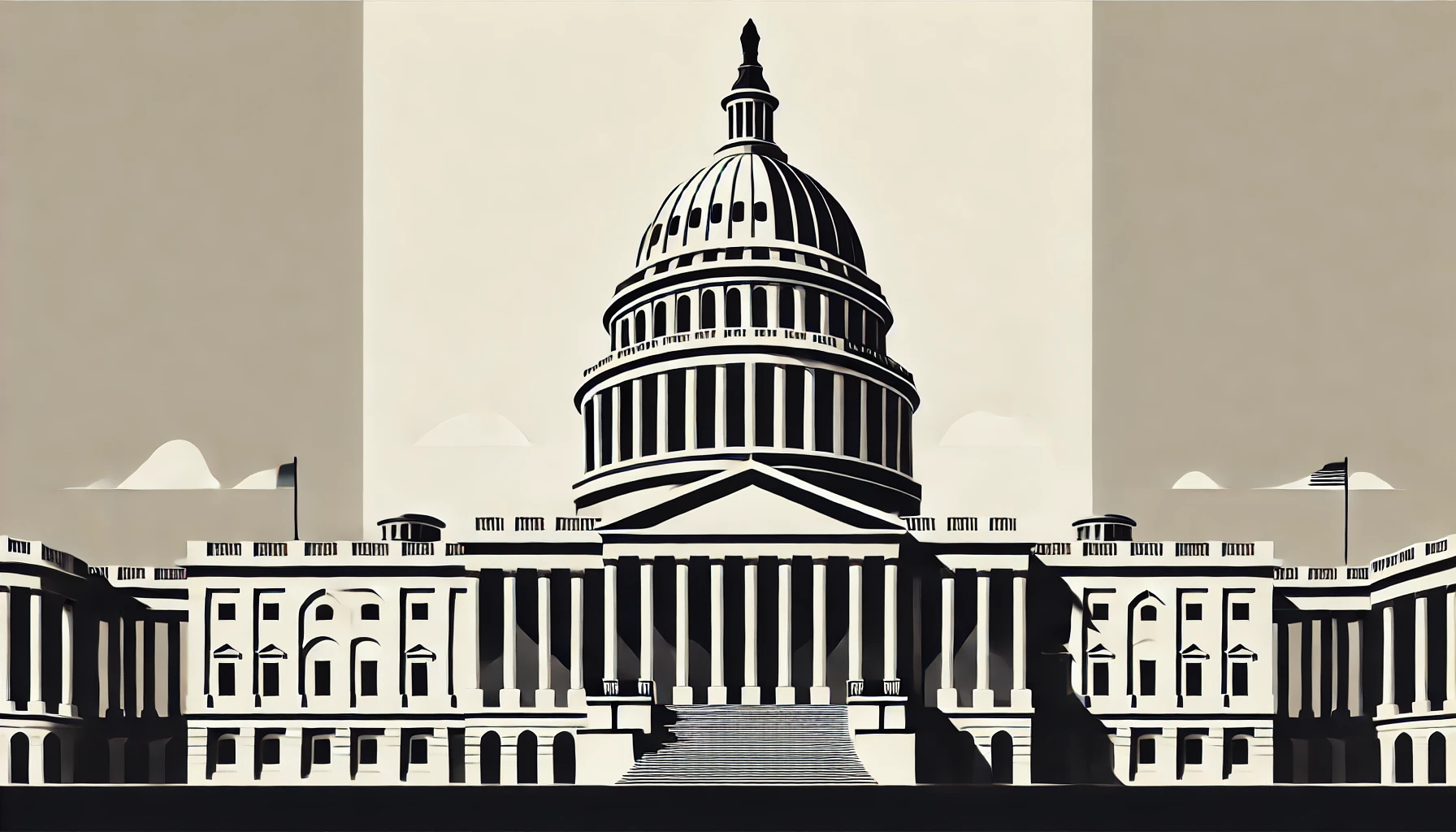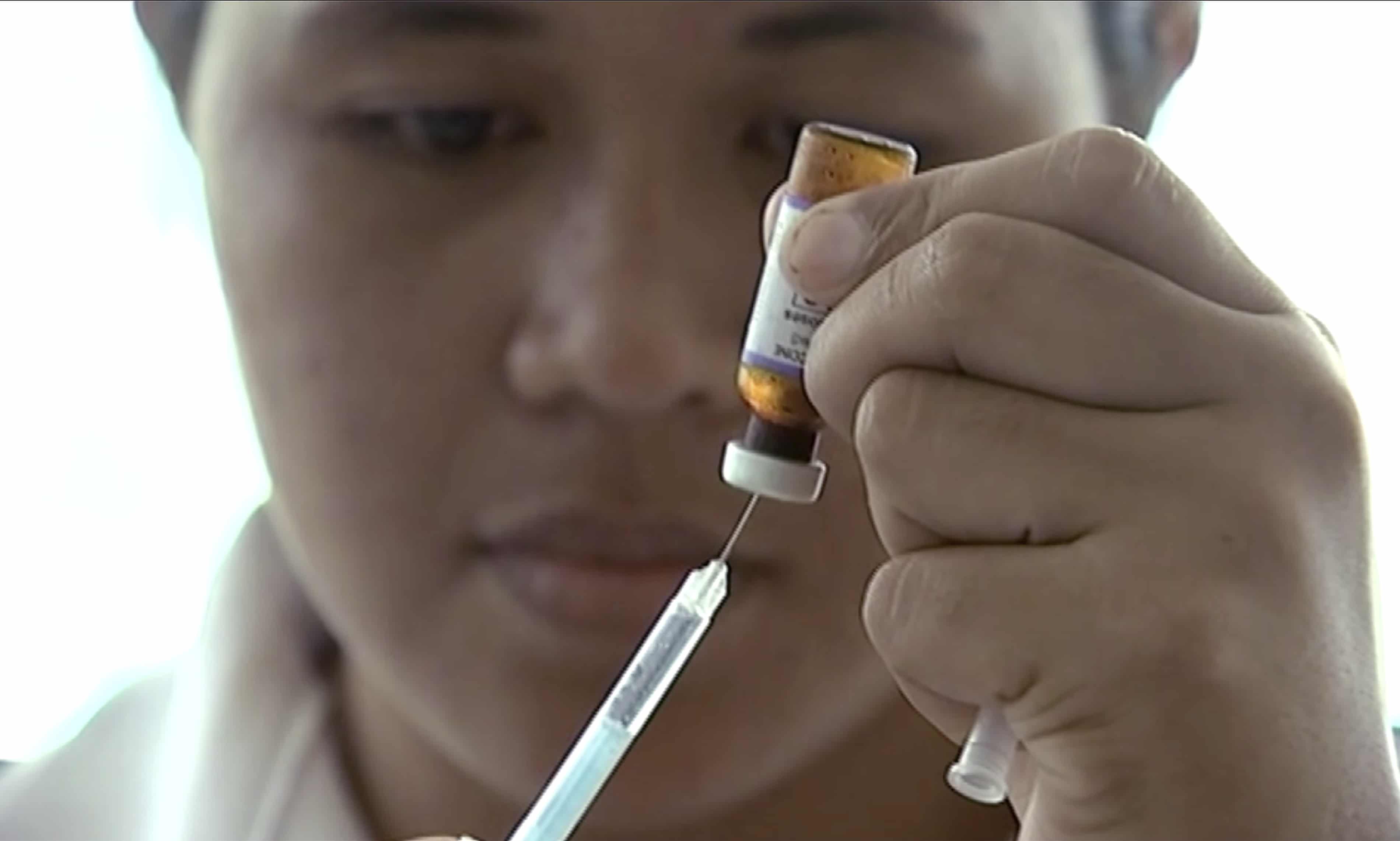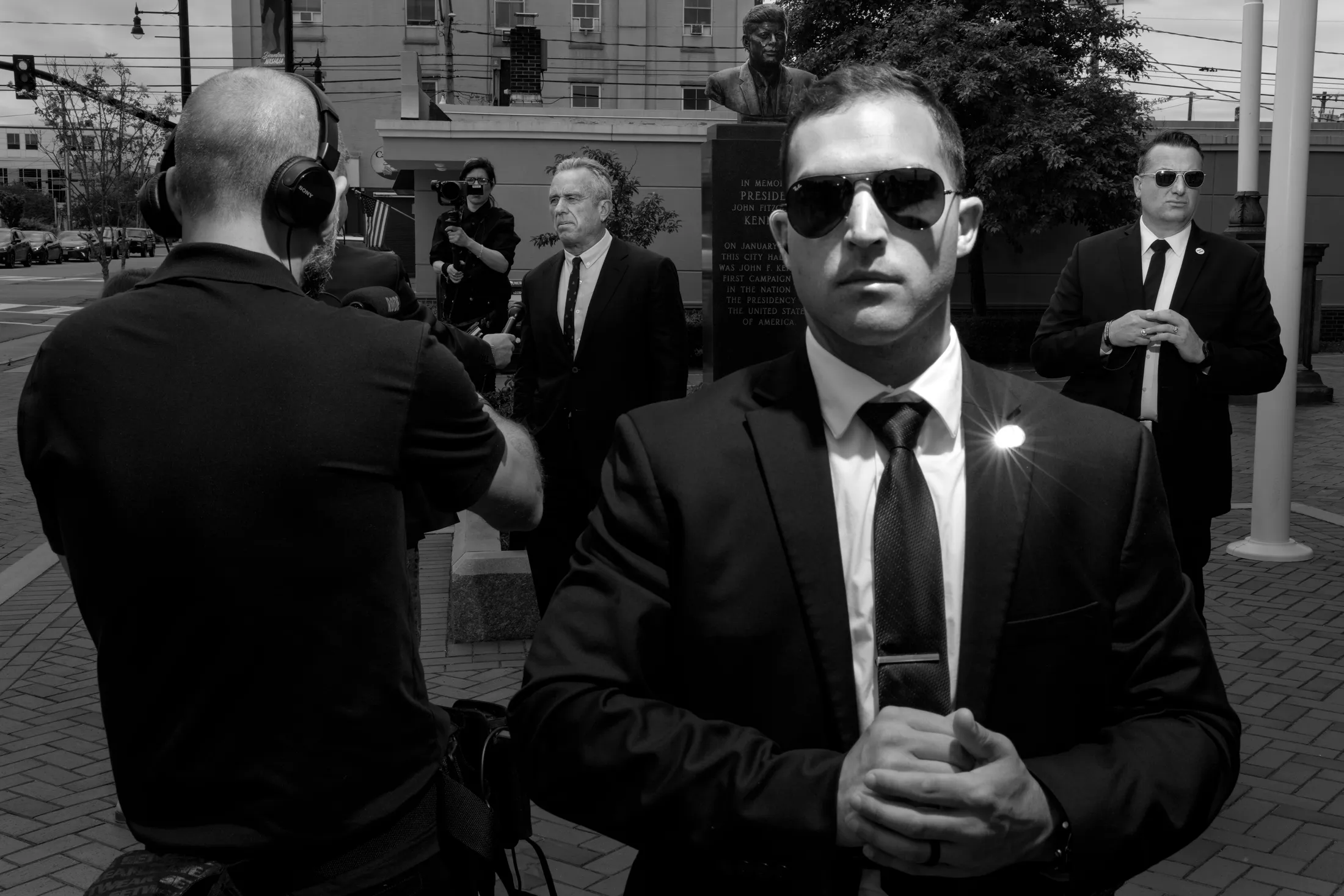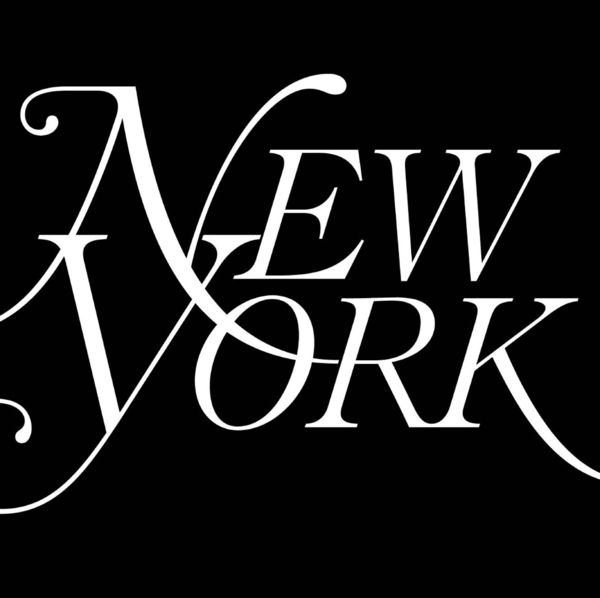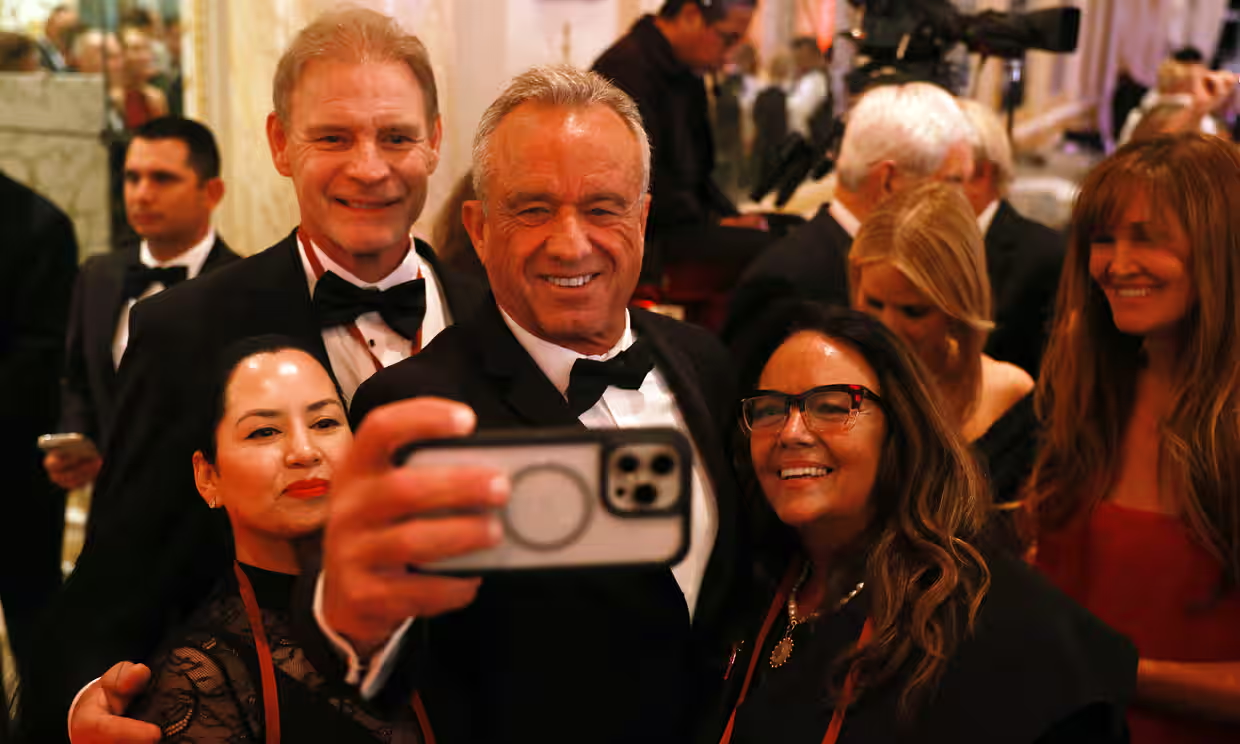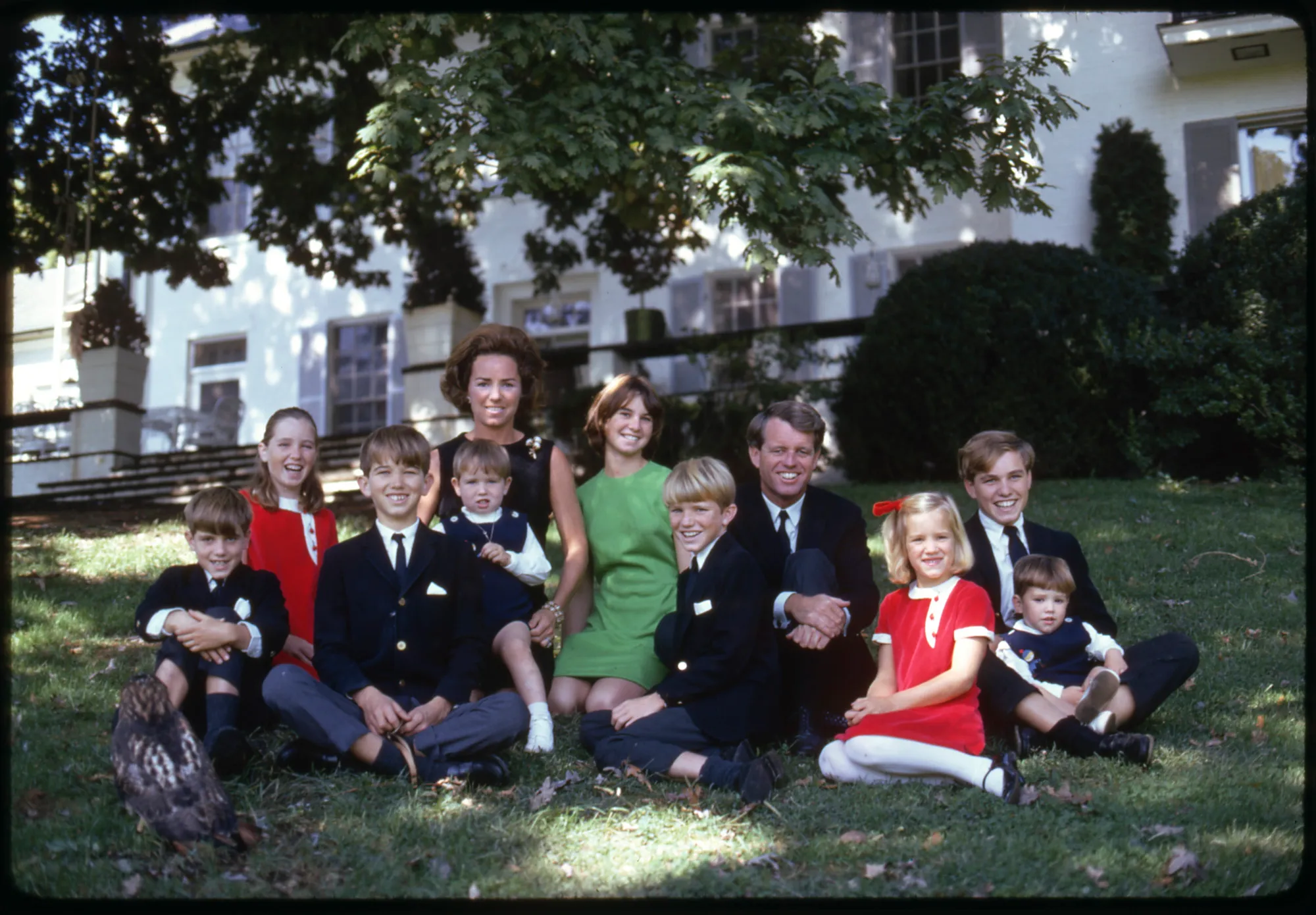MISLEADING CLAIMS
RBG a champion of medical freedom?
Background
On or about September 20, 2020, CHD’s (and RFK Jr’s) Facebook page posted a link to an editorial tribute to Ruth Bader Ginsburg (“RBG”) entitled “R.I.P. RBG” (Figure 1). Information in the article was checked by USA TODAY, an ‘independent third-party fact checker’ working with Meta (which owns Facebook and Instagram, among other platforms).
Contested claim: RBG is a champion of medical freedom (CHD, RFK Jr, 200922)
USA TODAY’s fact-check
USA TODAY’s fact-check verdict: Missing context (200927)
Facebook action: Missing context (200922; perma)
Context: USA TODAY deemed the claim “missing context” (see Verdict detail), explaining that RFK Jr.’s caption on his IG post pointed to a case where RBG dissented as evidence supporting the claim. USA TODAY quoted RFK Jr’s editorial: “In 2015, RBG joined Sotomayor in a withering dissent of Judge Scalia’s historic decision in Bruesewitz v. Wyeth. Scalia and his corporatist brethren interpreted the National Childhood Vaccine Injury Act of 1986 (NCVIA) to shield Big Pharma with full immunity from liability for vaccine injuries. Their decision removed all incentives for pharmaceutical corporations to make vaccines safe, and Americans forfeited their seventh amendment right to jury trial against vaccine companies that harmed them, no matter how negligent” (CHD, RFK Jr, 200922). Facebook added the following warning label to the Facebook post: “Missing context. Independent fact-checkers say this information could mislead people” (Figure 3).
Verdict detail: “The case Robert F. Kennedy Jr. cites as a reason Ruth Bader Ginsburg was a “medical freedom activist” was not about medical freedom. The case did not remove “all incentives” to keep vaccines safe, however, the decision did protect pharmaceutical companies from vaccine injury liability. Ginsburg’s dissent was related in a broader sense to medical products, not just vaccines. We rate this claim MISSING CONTEXT, because it could be misleading” (USA TODAY, 200927)
Our assessment
Editorial opinion: RFK Jr’s editorial tribute to RBG was determined by USA TODAY to be “missing context, because it could be misleading,” in a fact-check entitled, “Justice Ruth Bader Ginsburg’s dissent in pharmaceutical case wasn’t anti-vaccine” (200927).
RFK Jr writes that RBG was an environmental champion and a champion for safe vaccines and lists her written opinions and dissents, which support why he believes this to be true. In his editorial, RFK Jr. cites Bruesewitz v. Wyeth, a 2015 case in which RBG and Sonia Sotomayor dissented as evidence supporting the medical freedom claim. The majority “interpreted the National Childhood Vaccine Injury Act of 1986 (NCVIA) to shield Big Pharma with full immunity from liability for vaccine injuries. Their decision removed all incentives for pharmaceutical corporations to make vaccines safe, and Americans forfeited their seventh amendment right to jury trial against vaccine companies that harmed them, no matter how negligent,” the editorial reads. RBG and Sotomayor “pointed out that tort suits, including discovery, were the only force incentivizing drug companies to make vaccines safe. They said, ‘Tort suits uncover unknown drug hazards and provide incentives for drug manufacturers to disclose safety risks promptly.’”
USA TODAY’s fact-check, like RFK Jr’s tribute to RBG, is editorial opinion. The author relies on interviews with two professors who imply, among other things, that medical freedom is a code word for the anti-vaccination movement, and the protection the pharmaceutical industry currently has from vaccine injury liability resulted in “The whole game that the anti-vaxxers actually cared about was taken off the table fully.” This game, presumably, involves companies’ ability to be punished for creating dangerous products, a mechanism for keeping consumers safe from harm.
“The case Robert F. Kennedy Jr. cites as a reason Ruth Bader Ginsburg was a ‘medical freedom activist’ was not about medical freedom,” the USA TODAY fact-check concludes. “The case did not remove ‘all incentives’ to keep vaccines safe, however, the decision did protect pharmaceutical companies from vaccine injury liability. Ginsburg’s dissent was related in a broader sense to medical products, not just vaccines. We rate this claim MISSING CONTEXT, because it could be misleading.”
Here is the opening paragraph of Sotomayor and RBG’s dissent:
Vaccine manufacturers have long been subject to a legal duty, rooted in basic principles of products liability law, to improve the designs of their vaccines in light of advances in science and technology. Until today, that duty was enforceable through a traditional state-law tort action for defective design. In holding that §22(b)(1) of the National Childhood Vaccine Injury Act of 1986 (Vaccine Act or Act), 42 U. S. C. §300aa–22(b)(1), pre-empts all design defect claims for injuries stemming from vaccines covered under the Act, the Court imposes its own bare policy preference over the considered judgment of Congress. In doing so, the Court excises 13 words from the statutory text, misconstrues the Act’s legislative history, and disturbs the careful balance Congress struck between compensating vaccine-injured children and stabilizing the childhood vaccine market. Its decision leaves a regulatory vacuum in which no one ensures that vaccine manufacturers adequately take account of scientific and technological advancements when designing or distributing their products. Because nothing in the text, structure, or legislative history of the Vaccine Act remotely suggests that Congress intended such a result, I respectfully dissent.
To say that Bruesewitz v. Wyeth was a case about medical freedom, “or even vaccine safety, is false,” according to Kirkland and Reiss. “‘This isn’t medical choice at all, and it can’t be considered an anti-vaccine decision,’ Reiss said. ‘You can say Justice Ginsburg was about making it easy for people to be compensated for injuries related to a medical product, not just vaccines.’”
RFK Jr never claimed RBG’s dissent was “an anti-vaccine decision,” he claimed RBG was a champion for safe vaccines.
Assessment highlights:
- USA TODAY determined that RFK Jr’s editorial tribute to RBG was “missing context, because it could be misleading” in a fact-check entitled “Justice Ruth Bader Ginsburg’s dissent in pharmaceutical case wasn’t anti-vaccine” (200927).
- USA TODAY’s fact-check, like RFK Jr’s tribute to RBG, is editorial opinion. However, the fact-check relies heavily on opinion and, at times, nonsensical statements, including ones that assert a United States Supreme Court case that decided whether a section of the Vaccine Act of 1986 preempts all vaccine design defect claims against vaccine manufacturers is not about vaccine safety. On the other hand, RFK Jr writes that RBG was an environmental champion and a champion for safe vaccines and lists her written opinions and dissents, which support why he believes this to be true.
- RFK Jr never claimed RBG’s dissent was “an anti-vaccine decision.” He claimed RBG was a champion for safe vaccines, as documented in Bruesewitz v. Wyeth and cited in the editorial.
Respondent’s reply
CHD filed a lawsuit claiming that Facebook, its CEO Mark Zuckerberg, and associated fact-checking organizations unfairly targeted and censored their content. The lawsuit alleges that this censorship violated CHD’s constitutional rights by collaborating with government entities to suppress free speech, falsely labeling CHD’s content as misinformation, engaging in deceptive and coordinated efforts to discredit their work, and causing significant reputational and financial harm. The following excerpt is taken from CHD’s 2020 complaint document.
Respondent: CHD (CHD vs Facebook Complaint, 201113)
- 4.188 | On September, 20, 2020, Facebook labeled an editorial tribute to Ruth Bader Ginsburg (“RBG”) as “Missing Context” and added a USA Today “fact-check” notice to the post taking issue with the term, “Medical Freedom.” …
- 4.188 | … In CHD’s editorial post entitled RIP RBG – Medical Freedom and Environmental Champion, RFK, Jr. writes that “Justice Ginsburg was a champion for safe vaccines” and lists her opinions and dissents which support his assertion. This application of “fact-checking” to editorial opinion is false and misleading. …
- 4.188 | … RFK, Jr.’s opinion is not “missing context” at all. RFK, Jr. also hails RBG as an “Environmental Champion,” and lists her written opinions which support why he believes this to be true – i.e., the same sort of evidence of RBG’s pedigree as he uses to support his “Medical Freedom Champion” assertion.
USA TODAY’s fact-check is inaccurate
Highlights:
- USA TODAY determined that RFK Jr’s editorial tribute to RBG was “missing context, because it could be misleading” in a fact-check entitled “Justice Ruth Bader Ginsburg’s dissent in pharmaceutical case wasn’t anti-vaccine” (200927).
- USA TODAY’s fact-check, like RFK Jr’s tribute to RBG, is editorial opinion. However, the fact-check relies heavily on opinion and, at times, nonsensical statements, including ones asserting that a United States Supreme Court case that decided whether a section of the Vaccine Act of 1986 preempts all vaccine design defect claims against vaccine manufacturers is not about vaccine safety.
- To say that Bruesewitz v. Wyeth was a case about medical freedom, “or even vaccine safety, is false,” according to professors interviewed in USA TODAY. “‘This isn’t medical choice at all, and it can’t be considered an anti-vaccine decision,’ Reiss said. ‘You can say Justice Ginsburg was about making it easy for people to be compensated for injuries related to a medical product, not just vaccines.’”
- Claiming that a case including the following judgments is not about vaccine safety defies belief:
- “It granted Wyeth summary judgment…which provides that “[n]o vaccine manufacturer shall be liable in a civil action for damages arising from a vaccine-related injury or death associated with the administration of a vaccine after October 1, 1988, if the injury or death resulted from side-effects that were unavoidable even though the vaccine was properly prepared and was accompanied by proper directions and warnings.”
- “Held: The NCVIA preempts all design-defect claims against vaccine manufacturers brought by plaintiffs seeking compensation for injury or death caused by a vaccine’s side effects”
